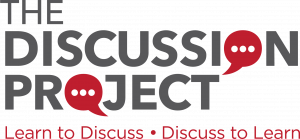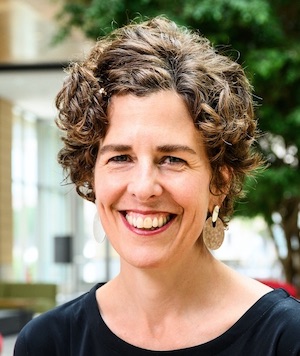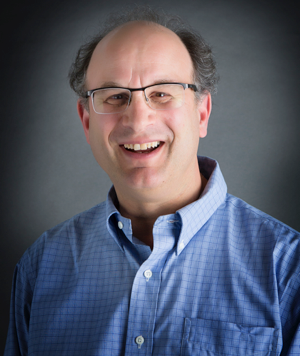For instructors, a great discussion produces the teaching equivalent of a runner’s high.
But as most realize, while it’s relatively easy to get students to talk in class, getting them fully engaged in an intellectually productive and satisfying classroom discussion is much harder.
 “Having a teacher set up an organized and functional discussion greatly improves the classroom dynamic and allows students to take a more active role in the classroom and in their education,” says Hannah McBride, who graduated from UW–Madison in 2020 with undergraduate degrees in biochemistry and biology, and whose instructors had taken The Discussion Project.
“Having a teacher set up an organized and functional discussion greatly improves the classroom dynamic and allows students to take a more active role in the classroom and in their education,” says Hannah McBride, who graduated from UW–Madison in 2020 with undergraduate degrees in biochemistry and biology, and whose instructors had taken The Discussion Project.
In other words, when students discuss, they learn.
They learn to discuss; that is, they learn the skills of discussion, such as listening, inquiring, and building on others’ ideas.
And they also discuss to learn: through discussion, they learn course concepts more deeply.
Enter The Discussion Project, a course on how to get that teaching high. It’s free to any UW–Madison instructor and offered multiple times a year. The Discussion Project can be taken as a three-day, in-person course or over seven, two-hour sessions online. (Apply here for the in-person course this August.)

After four years of fine-tuning its curriculum based on feedback from the nearly 500 UW–Madison instructors who have taken the course, The Discussion Project teaching team is confident that its sessions on designing and implementing high-quality classroom discussion are both needed and useful.
“I was fortunate to take part in your training,” says UW–Madison’s Kathy Cramer, a professor with the Department of Political Science, and the Natalie C. Holton Chair of Letters & Science. “I am not exaggerating when I say it has changed my life. … I am using the skills you taught me each class session. It has made me think differently about my teaching and I am quite sure the students’ experience is all the better for it.”
Initially developed by UW–Madison School of Education Dean Diana Hess and Paula McAvoy, then an academic staff member with the Wisconsin Center for Education Research, The Discussion Project fulfilled the 2016 UW-Madison Climate Survey’s call for promoting instructional best practices that ensure an inclusive learning environment. Focusing first on the classroom conditions that allow discussion to succeed, The Discussion Project guides instructors to build an inclusive and equitable learning environment that values — and hears from — all voices.
Across the spectrum — tenured-faculty to first-year teaching assistants — The Discussion Project participants have found immediate value from their learning.

“For the first time in my three-decade career, I had the opportunity to discuss, debate, and revel in ideas presented by a wide swath of teachers across the university,” says UW–Madison’s Gil Nathanson, a professor with the Department of Chemistry. “I was startled by the originality and freshness of the suggestions, many of which can be translated to teaching science. I would gladly recommend the Discussion Project to all who are interested, even if you are an instructor in a large class.”
Adds Kandyce Anderson Amie, a PhD student and teaching assistant with the School of Education’s Department of Curriculum and Instruction: “The opening activities to promote immediate class engagement, rubrics for virtual learning, experiences engaging with different discussion techniques, rather than just reading about them — they were all extremely useful for my practice.”
Learning in The Discussion Project course is active. Participants see modeling of strategies, but also experience, practice, and apply the skills. Infused throughout the sessions is a focus on building community to include all voices in our classrooms in the interest of valuing our diversity and ensuring educational equity. Earlier modules in the course focus on specific skills, such as how to structure small group discussion, craft questions, and facilitate whole class interactions. By the end of the course, participants plan their own classroom discussion and receive feedback from their peers on their plan.
Because The Discussion Project is also a large-scale, mixed-methods research study, the curriculum and instruction benefits from findings that inform understanding of students’ and instructors’ needs in making engaging discussion occur. For example, the team now knows that well-structured, small group discussion is critical for increasing student participation and learning, and that instructors need a firm concept of what discussion is and isn’t in order to successfully plan and execute in the classroom.
The project’s research component has also shown that discussion classrooms are engaged and intellectually alive classrooms because high quality classroom discussion requires students to inquire, consider different perspectives, listen to others, and deepen learning. In other words, to sift and winnow, a fulfillment of the Wisconsin Idea. The Discussion Project’s focuses on the dynamism of the university classroom, but also acknowledges that the skills students learn through discussion are the skills of democracy.
This work is being supported by the the Andrew W. Mellon Foundation, in addition to generous donors to the School of Education.
To find out more, and to apply for the course, visit: https://discussion.education.wisc.edu/